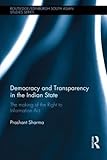Democracy and transparency in the Indian state the making of the right to Information Act
Material type: TextSeries: Routledge/Edinburgh South Asian studies seriesPublication details: London Rouledge Publisher 2015ISBN:
TextSeries: Routledge/Edinburgh South Asian studies seriesPublication details: London Rouledge Publisher 2015ISBN: - 9781138802179
- KNS2119.A312005 S53 2015
 Print
Print
| Item type | Home library | Collection | Call number | Status | Date due | Barcode | |
|---|---|---|---|---|---|---|---|
 Print
Print
|
OPJGU Sonepat- Campus Main Library | General Books | 342.6620954 SH-D (Browse shelf(Opens below)) | Available | 131547 |
Includes bibliographical references and index.
Prologue -- Democratic Deepening and the Right to Information -- The Dominant Narrative -- Digging Up the Grassroots -- Opening Up the Government -- The Foreign Hand -- How Deep is My Democracy?
"The enactment of the national Right to Information (RTI) Act in 2005 has been produced, consumed and celebrated as an important event of democratic deepening in India both in terms of the process that led to its enactment (arising from a grassroots movement) and its outcome (fundamentally altering the citizen-state relationship). This book proposes that the explanatory factors underlying this event may be more complex than imagined thus far.The book discusses how the leadership of the grassroots movement was embedded within the ruling elite and possessed the necessary resources as well as unparalleled access to spaces of power for the movement to be successful. It shows how the democratisation of the higher bureaucracy along with the launch of the economic liberalisation project meant that the urban, educated, high-caste, upper-middle-class elite that provided critical support to the demand for an RTI Act was no longer vested in the state and had moved to the private sector. It goes on to investigate the Indian RTI Act within the global explosion of freedom of information laws over the last two decades, and shows how international pressures had a direct and causal impact both on its content and the timing of its enactment.Taking the production of the RTI Act as a lens, the book argues that while there is much to celebrate in the consolidation of procedural democracy in India over the last six decades, existing social and political structures may limit the extent and forms of democratic deepening occurring in the near future. It will be of interest to those working in the fields of South Asian Law, Asian Politics and Civil Society"--
There are no comments on this title.

